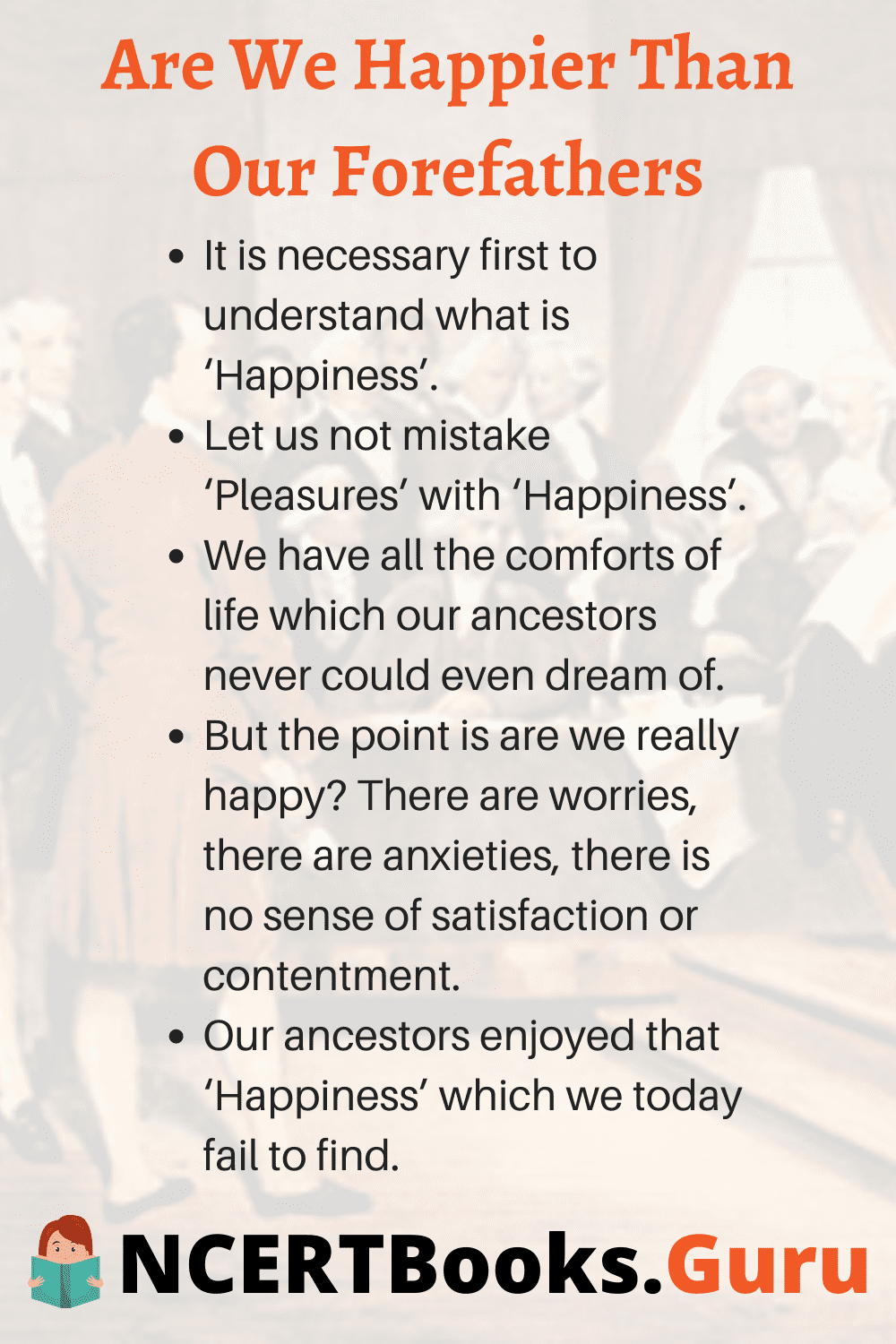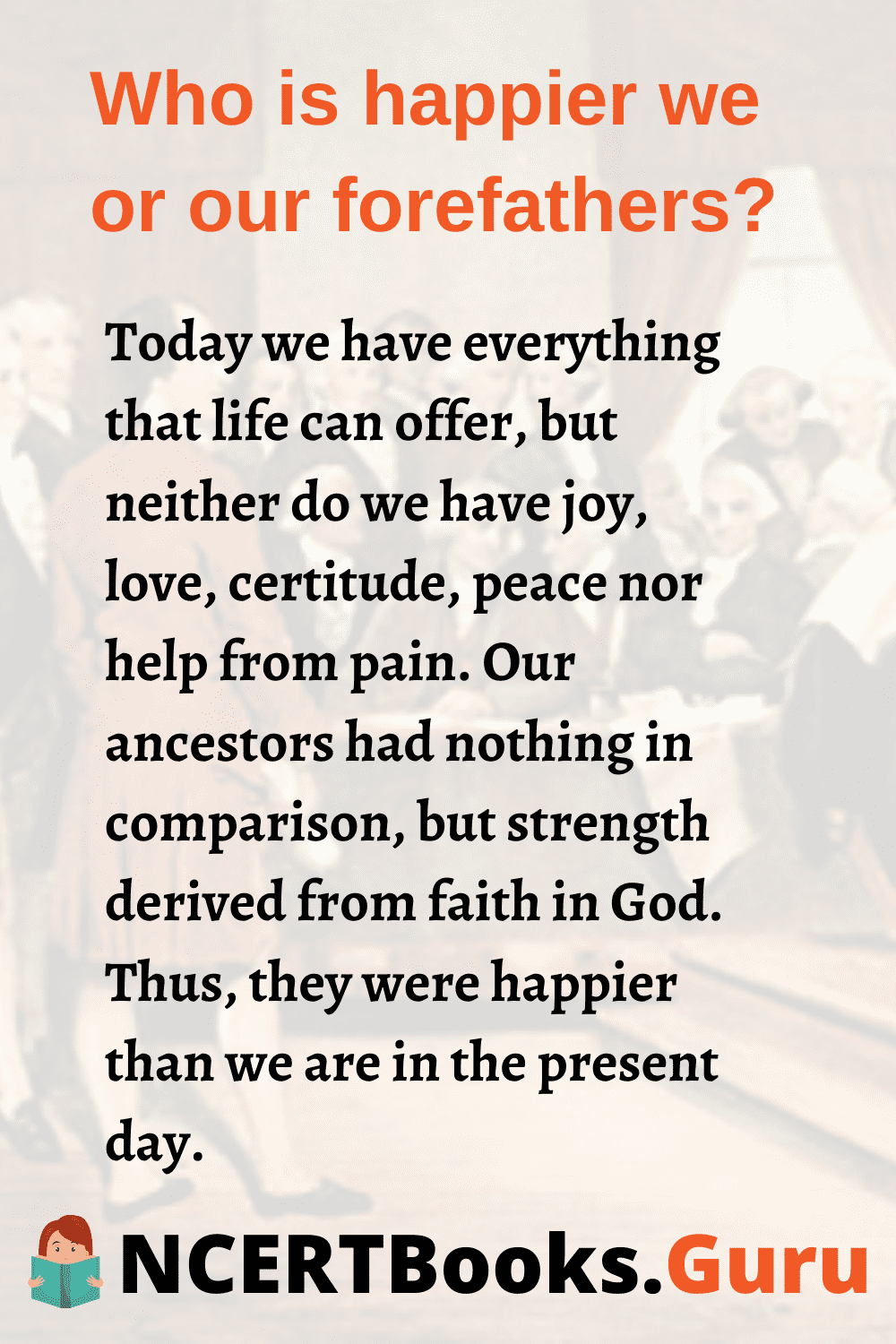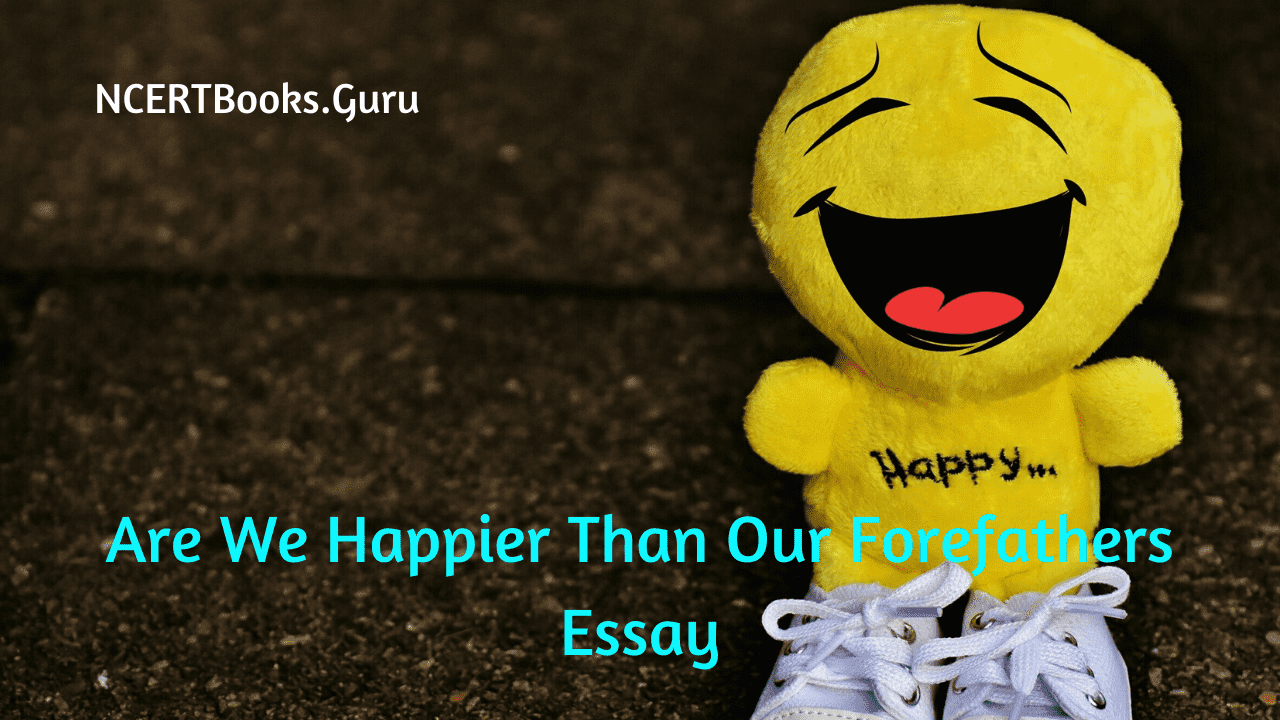Are We Happier Than Our Forefathers Essay: To deal with this subject one must first understand what ‘happiness’ means.
- Long Essay on Are We Happier Than Our Forefathers 500 Words in English
- Short Essay on Are We Happier Than Our Forefathers 100 Words in English
- 10 Lines on Are We Happier Than Our Forefathers
- How are we happier than our forefathers?
- Who is happier we or our forefathers?
- Are we better than our forefathers?
Long and Short Essays on Are We Happier Than Our Forefathers for Kids and Students in English
Given below are two essays in English for students and children about the topic of ‘Are We Happier Than Our Forefathers’ in both long and short form. The first essay is a long essay on the Are We Happier Than Our Forefathers of 400-500 words. This long essay about Are We Happier Than Our Forefathers is suitable for students of classes 7, 8, 9 and 10, and also for competitive exam aspirants. The second essay is a short essay on Are We Happier Than Our Forefathers of 150-200 words. These are suitable for students and children in class 6 and below.
Long Essay on Are We Happier Than Our Forefathers 500 Words in English
Below we have given a long essay on Are We Happier Than Our Forefathers of 500 words is helpful for classes 7, 8, 9, and 10 and Competitive Exam Aspirants. This long essay on the topic is suitable for students of class 7 to class 10, and also for competitive exam aspirants.
We have not to misunderstand ‘pleasure’ with ‘happiness’. A lavish lifestyle, a rich home a big bungalow, and a luxurious car are today treated as the means of ‘happiness’. We are very ‘happy’ if we have all this. But it is such a mistaken belief. All these are ‘pleasures’ and ‘comforts’ of life. Physical comforts are the mirage which gives a false sense of ‘happiness’.
Man has three parts of his being the physical, the mental, and the spiritual. Physical comforts are the lowest in the ladder. Healthy thoughts, right behavior give one the mental well-being. Serving others, being good to people, gives one a miner solace and satisfaction that is a spiritual well being.

So here lies the difference between ‘pleasure’ and ‘happiness’. To have a lot of eating and drink is all enjoying the pleasures of life.
A hermit living in a hut may have so much self-satisfaction. He serves people who go to him with words of high thoughts and advice on worthy living. He is a man in rags, eats whatever he gets as a charity, still he is ‘happy’. He does not have the ‘pleasures’ of life but he has the ‘happiness’ of his mind and soul.
We today have everything at our command, Science is at our beck and call. We have all the comforts of life which our ancestors never could even dream of. Means of transport, means of communication, means of entertainment — Cinema, T.V. with so many channels — phones, E-mails, Fax, Internet whatnot. Still, if you ask even the richest of men if he is really ‘happy’, he may just shake his head to show ‘no, not that’. There are worries, there are anxieties, there is no sense of satisfaction or contentment.
Men of the past had little but they lived all in a joint family serving each other, one another in their needs sharing whatever they could produce or earn. They lived a life of frugality but contentment. They worked hard and could have a sound sleep at night. The home housed cousins, brothers, uncles, aunts all under one roof. Now there are two room cubicles in large busy towns no space even for parents to come and stay. There had been an affectionate bond binding all in the past; there is a distance now even among the brothers. ‘What is this life so full of care’ is what can be said of today’s living.
Short Essay on Are We Happier Than Our Forefathers 100 Words in English
Below we have given a short essay on Are We Happier Than Our Forefathers is for Classes 1, 2, 3, 4, 5, and 6. This short essay on the topic is suitable for students of class 6 and below.
Happiness comes from within. It is a sense of contentment that comes from the core of the heart. “There is a couplet in Hindi which when translated says ‘All the wealth cows, elephant, horses and all the jewels their treasure.
Nothing equals contentment everything turns meaningless in measure.
It is this contentment which is the basis of ‘Happiness’ and it is this that lacks in today’s life while that was there is the past.
That tilts the balance of ‘Happiness’ in favor of our ancestors.
Students can find more English Essay Writing Topics, Ideas, Easy Tips to Write Essay Writing, and many more.
10 Lines on Are We Happier Than Our Forefathers
- It is necessary first to understand what is ‘Happiness’.
- Let us not mistake ‘Pleasures’ with ‘Happiness’.
- Physical comforts do not and cannot give ‘Happiness’.
- ‘Happiness’ is a state of mind that comes from contentment.
- We today have everything at our command, Science is at our beck and call. We have all the comforts of life which our ancestors never could even dream of.
- But the point is are we really happy? There are worries, there are anxieties, there is no sense of satisfaction or contentment.
- Men of the past lived together, lived for one another, worked hard, and slept soundly. They were contented with their lot.
- Even the richest man of today is not contented.
- Wealth and riches cannot bring ‘Happiness’ — mind and soul are its seats.
- Our ancestors enjoyed that ‘Happiness’ which we today fail to find.

FAQs on Are We Happier Than Our Forefathers Essay
1. How are we happier than our forefathers?
We should be happier because we have our forefathers’ experience to learn from. We should be using their experiences and sacrifice to teach us how to be better.
2. Who is happier we or our forefathers?
Today we have everything that life can offer, but neither do we have joy, love, certitude, peace nor help from pain. Our ancestors had nothing in comparison, but strength derived from faith in God. Thus, they were happier than we are in the present day.
3. Are we better than our forefathers?
We can’t just blatantly say yes or no to this question. According to me on some basis, they were happier and on some basis, we are happier. It’s just about on what basis we define happiness.
Polonious Advice Summary

